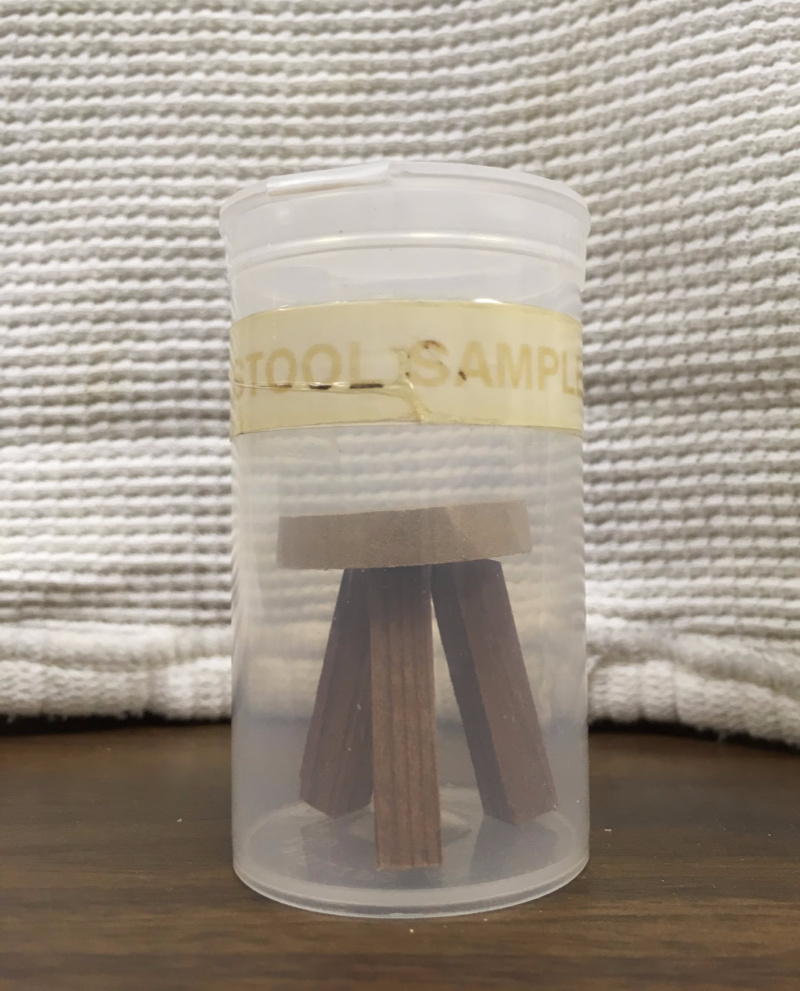If your veterinarian staff request a stool sample…please do not bring them one of these! I got a good laugh when one of my clients presented me with this “stool” sample a few years ago. I keep it around as a reminder to be more specific when talking with clients about their pets. It is a great conversation piece as well. Why are stool samples, or more appropriately called fecal samples, important?
I have mentioned parasites such as fleas, ticks, and heartworms, but have yet to share important information about the “other parasites” that can be just as deadly if not treated. To start the new year off right for your furry friends I hope to enlighten my readers with some common knowledge about the “other parasites.”
Kittens and puppies are commonly infected with intestinal worms at the time of birth. The mother can infect her babies while still in the uterus and the parasites can be spread through nursing. The most common intestinal parasite is the roundworms that can be found in all pets but especially in kittens and puppies. These parasites can appear like a piece of spaghetti and can be seen in vomit or stools. When seen in stools or vomit you know that this pet is loaded with roundworms. The belly is usually more rounded and bloated. The scary part is that these roundworms can be present and no symptoms noted except microscopic eggs being found in a stool specimen. We encourage every owner of a puppy or kitten to have a stool sample check. These parasites are a stress to the immune system and need to be treated. Humans can contact this parasite and it will lead to infection within the liver, eyes, and or Central Nervous System. There must be direct stool to mouth contact with the parasite eggs. The most common place for this to occur is with sand boxes and children. Cats love to use sand boxes as litter boxes and many children have been known to put sand into their mouths. We encourage people to cover sandboxes if possible and watch children when playing in them.
Hookworms are another intestinal parasite that can infect our pets. This parasite can cause anemia in any pet but especially the young. We also have seen skin lesions in heavily parasitized pets. Diarrhea is commonly associated with this parasite and can be difficult to find in a runny stool. The hookworm can be transmitted to people. It will cause a rash that can be itchy. Humans can be exposed through contact with the skin when walking barefoot or sitting in areas where hookworm larvae are present.
Whipworms are another parasite that can infect dogs more than cats. When present they shed microscopic eggs in small numbers making it difficult to find them in a stool specimen. They cause dogs to lose weight, have diarrhea, and sometimes cause anal itching. Anal gland impaction and allergies can cause anal itching also. Therefore it is important to consider all causes for anal itching. This parasite is less common than the roundworms or hookworms, but just as important to prevent.
Tapeworms are common in both dogs and cats. This parasite is the most common worm that owners are aware of. When asking people if they have dewormed their furry friend, I often hear, “I do not see any worms in the stool.” This is the only worm that 100% of the time will eventually be seen in the stool or even attached to the hair around the tail. This worm can be up to 6 inches in length and will break off in tiny white segments and eventually work its way out of the rectum and onto the stool or the area around the rectum. When it dries up on the hair or stool it almost appears to be like a sesame seed. If a pet licks or swallows one of these segments the infection will begin again. Fleas can transmit tapeworms and therefore infect pets when they swallow a flea. Rabbits and mice are common carriers of tapeworms. Guess who likes to eat mice? Our hunting cats are commonly infected by these parasites and therefore we recommend routine deworming. This parasite is more difficult to find in our fecal floatation, but owners usually do not miss this parasite when present.
What options are available to treat these “other parasites”? In the last many years our heartworm preventions have added intestinal parasite preventatives to their formula. At Winterset Veterinary Center we encourage owners to use Interceptor Plus monthly as a heartworm prevention and an intestinal parasite preventative for roundworms, hookworms, whipworms, and tapeworms. As of today this is the only heartworm prevention that prevents all 4 of the most common intestinal parasites for dogs. Over the counter intestinal dewormers may treat certain parasites but often not all of them.
For our cats we recommend Profender which is a topical intestinal dewormer that can be placed on the skin and done 3-4 times a year. It will treat roundworms, hookworms, and tapeworms. With both of these products the parasites are removed within a few days after the product is given. If the pet is exposed again soon after the treatment, they can get the infection right back. There is no product on the market that will continue to prevent or treat our furry friends after administration.
If your pet has been diagnosed with intestinal parasites, every stool that pet has deposited in your yard or litter box has those parasite eggs in it. The stool disappears as it is being decomposed. When the stool is gone the microscopic egg will remain in the environment. This is an opportunity for your pet to pick the infection back up. If your pet stays strictly indoors and is not a hunter and does not have fleas, then it would be unlikely they would become exposed. The one common cause that many people do not think about is bringing home that new puppy or kitten. Every new pet brought into the home is a potential source of infection for your current pets. Do yourself a favor and keep new pets away from your furry family members until they have been checked by your veterinarian. Definitely bring in the “stool” sample to make certain your pet is intestinal parasite free!
As we close out 2018, I want to take this opportunity to thank you for following my blog. If you have found a topic interesting or have a topic that you would like to suggest, please visit with me about it. Winterset Veterinary Center hopes everyone has a happy and healthy 2019. See you next year!

